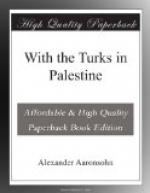[ILLUSTRATION: HAIFA]
CHAPTER IX
A ROBBER BARON OF PALESTINE
Beirut is a city of about two hundred thousand inhabitants, half of whom are Christians and the rest Mohammedans and Jews. The pinch of hunger was already felt there. Bread was to be had only on tickets issued by the Government, and prices in general were extremely high. The population were discontented and turbulent, and every day thousands of women came before the governor’s residence to cry and protest against the scarcity of bread.
The Allies’ warships often passed near the town, but the people were not afraid of them, for it was known that the Allies had no intention of bombarding the cities. Only once had a bombardment taken place. Toward the end of March, 1915, a French warship approached the bay of Haifa and landed an officer with a letter to the commandant of that town giving notice of his intention to bombard the German Consulate at 3 P.M. sharp. This was in retaliation for the propaganda carried on by the consul, Leutweld von Hardegg, and chiefly because of his desecration of the grave of Bonaparte’s soldiers. The consul had time to pack up his archives and valuables, and he left his house before three. The bombardment began exactly at three. Fifteen shells were fired with a wonderful precision. Not one house in the neighborhood of the consulate was touched, but the consulate itself was a heap of ruins after a few shells had struck it. The population was exceedingly calm. Only the German colony was panic-stricken, and on every German house an American flag was raised. It was rather humorous to see all the Germans who were active in the Turkish army in one capacity or another seek safety by means of this trick.
This bombardment had a sobering effect upon the Mohammedan population. They saw that the Allies were not wholly ignorant of what was going on in the country and that they could retaliate, and safety for the non-Mohammedans increased accordingly.
In general Beirut was a rather quiet and safe place. The presence of an American cruiser in the port had much to do with that. The American sailors were allowed to come ashore three times a week, and they spent their money lavishly. It was estimated that Beirut was getting more than five thousand dollars a week out of them. But the natives were especially impressed by the manliness and quick action of the American boys. Frequently a few sailors were involved in a street fight with scores of Arabs, and they always held their own. In a short time the Americans became feared, which in the Orient is equivalent to saying they were respected. The Beirut people are famous for their fighting spirit, but this spirit was not manifested after a few weeks of intimate acquaintance with the American blue-jackets.




